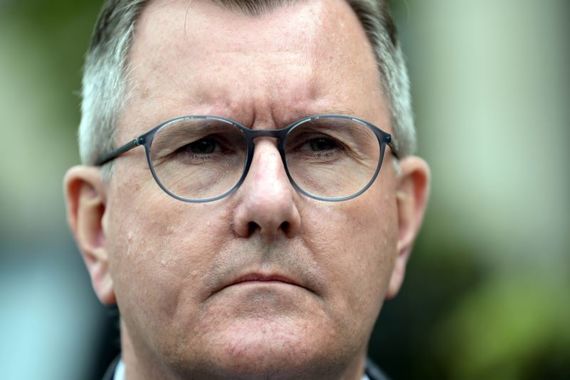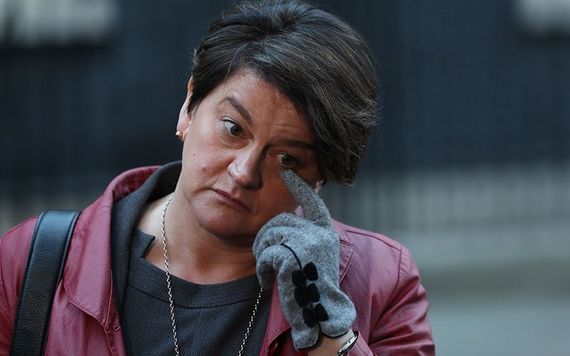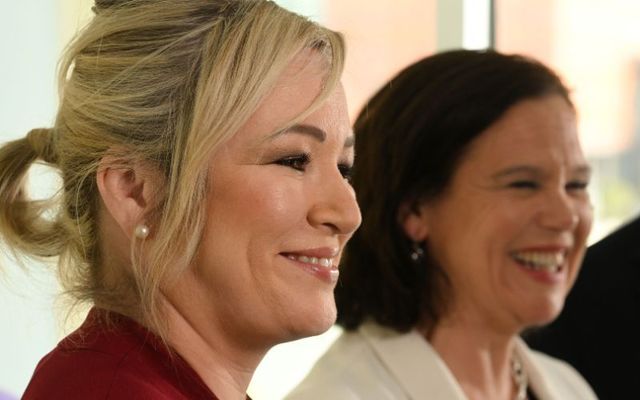When something truly momentous happens in Irish politics, silence can often be the first response.
That's probably why there was relative silence from the main Ulster unionist parties when the result from the North's council elections was read, since they were quietly stunned by the unstoppable pace of political change there themselves.
But in the rightward-leaning Dublin press like the Irish Independent, there was eerie silence too as Sinn Féin's record-breaking performance was greeted not with cheers but with the sound of crickets.

Sir Jeffrey Donaldson, head of the DUP. (Getty Images)
Apparently, the implications were as sobering in Dublin as in Belfast, but the conservative Dublin press decided to take a juvenile I-can't-see-you approach to the news.
On Saturday morning, when the scale of the dramatic vote had finally become clear, there wasn't a single mention of it in the 48-page Irish Independent, not a single column inch addressing the biggest political news story on the island: Sinn Féin's electoral triumph in the North.
In what they now clearly considered a crisis, The Independent didn't even try to hide their political bias. Instead, they simply ran to the bunkers and hoped that it would end. But that won't wash.
After the election results, there are as many pro-unity elected representatives as pro-unionist ones at the council level. But it goes further, the votes for pro-unity parties outnumbered those for pro-union parties for the first time in history.
The reversal that this represents is not trivial. Northern Ireland was founded in a geographic smash-and-grab to ensure perpetual unionist political and cultural dominance.
It drafted a special powers act that was once the envy of the former apartheid regime in South Africa. It was, even by its own admission, a cold house for Catholic nationalists.
That's all gone. The pace of Sinn Féin's progress has surprised even the party itself. Party members who have pressed for a progressive platform and deeper political engagement have been powerfully vindicated. Voters clearly want what they are selling.
Equally, the generosity of vision – derided by some – that First Minister-designate Michelle O'Neill demonstrated in attending King Charles's coronation stood in stark contrast to former First Minister Arlene Foster's sour remarks during President Biden's visit to Ireland, when she assured the press that he “hates the United Kingdom” and “was “pro-republican and pro-nationalist.”
This turned out to be another vote-getting exercise for the DUP, but it was nationalists who were getting out to vote, stung by Foster's dismissive comments and eager to put a sea border between this kind of rhetoric and the future.

Foster was not the only unionist making untoward and unhelpful remarks, however. The UUP's Danny Kennedy astounded panelists and viewers alike on BBC Northern Ireland when he claimed that Sinn Féin winning seats from unionists in a free and fair election was bad for community relations and contradicted their pledge to build a new Ireland.
What would Kennedy have them do, the panelists gasped? Political parties exist to win seats and govern, if winning was Kennedy's concern shouldn't his party offer a wider welcome to voters?
It was one of those moments when the unthinking but long-suspected entitlement of unionism was displayed on prime time, as was the depth of their inability to pursue a course for all, rather than for merely themselves.
Meanwhile, political and demographic change has arrived. It is now beyond all doubt what the trajectory is: the case for a border poll will become overwhelming within the next decade (probably sooner) and Dublin's broadsheets won't postpone it by burying their heads in the sand.
One other place that sees the writing on the wall is Leinster House, the seat of the Irish government, which would do well now to begin planning for inevitable change on the ground. The main political parties may not welcome the upheaval but it will be nothing compared to the upheaval of preparing to plan for inevitable change.
Reality has come knocking and neither the DUP nor the other main unionist parties, nor indeed the right-wing Dublin press, seem to be in a mind to welcome it yet. But the rest of us should not be caught off guard.




Comments